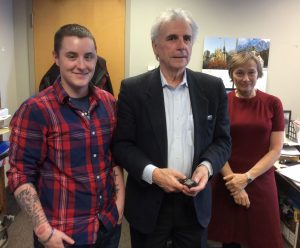By Deron Hamel
Adam Prashaw went through life facing many challenges but always persevered. On Jan. 24, Adam, 22, tragically died after suffering a seizure in his hot tub at his Ottawa home. But his story doesn’t stop there.

One day later and more than 500 kilometres away, in Welland, Ont., a 53-year-old man was given a new chance at life, thanks to Adam’s generosity. Adam was a registered organ donor and the man received his heart during a transplant.
It’s fitting that a man received Adam’s heart. Adam began life as a baby girl, born Rebecca Prashaw on April 22, 1993. At the time of his passing, Adam was in the process of transitioning into a man.
Adam’s struggle with epilepsy began at age 5, when he was Rebecca. Rebecca was having lunch at home one day when she suddenly stopped eating and froze, Adam’s mother, Suzanne Corbeil, recalls. Suzanne could not get a response from Rebecca, who, after suffering the seizure, went into a deep sleep. Shortly after, Rebecca was diagnosed with an atypical form of epilepsy.
During the next several years, Rebecca’s doctors worked to find the best medication and dosage to help her cope with her epilepsy. By age 12, she was taken off medications. She was still having small seizures, but doctors said she could live a full life without taking medications.
But the seizures persisted. Throughout Rebecca’s teen years, she suffered scores of small seizures that impacted her social, work and academic life. Still, the teenaged Rebecca, a lifelong hockey fan, worked hard to lead the life she wanted to live. She was a goalie for a hockey team. She graduated from high school and later from Algonquin College.
“His epilepsy … lurked in the shadows, biting so much at a normal, healthy life,” Adam’s father, Rick Prashaw, wrote in a Facebook post the night Adam died. “But like everything in this kid’s life, he coped, summoned his courage and soldiered on.”
At 18, Adam began having tonic-clonic seizures. Doctors performed two brain surgeries – including one in November 2015 – to try to control the seizures.
Adam took measures to meet the challenges of his epilepsy. He wore MedicAlert bracelets and set alarms on his mobile phone to remind him when to take medications. He made sure his friends knew of his condition and what to do if he had a seizure.
“Adam, to his credit, with all his challenges, he led a pretty normal life,” his mother says. “Adam also had the complexity of being a transgendered child, so his world shifted and changed and there were so many things he had to figure out, who he was, what his identity was, how to live with this disability and feel like a valuable contributor to society.”
Sadly, Adam died at a transition point in his life. He was going through the transgender process, had changed his name and was attending counselling sessions. He was becoming the person he always had been inside.
John Dickhout is the man who received Adam’s heart. Adam’s parents have met him in person. The similarities between Adam and John are remarkable. John is a fan of theatre, loves to play golf and is a Montreal Canadiens fan. Adam was all these things, too.
“(Adam’s heart) was a match medically, but I also think it’s a match to carry on something that Adam would be so proud of,” Suzanne says.
As tragic as Adam Prashaw’s story is, a part of him lives on in a meaningful way. While nothing can ever replace Adam, his mother takes a small degree of comfort knowing that Adam is helping someone else live.
“Everything that led to the day that Adam died and the day that John received his heart were destined to be, whether I like that or not,” Suzanne says. “It was meant to be.”
When asked if there was anything else she wanted to tell Voices of Epilepsy about Adam for this story, Suzanne didn’t hesitate in her reply.
“I am told by professionals that Adam was amazingly lucky that his parents, his siblings, his grandparents, his extended family, all accepted him for who he was and surrounded and supported him with love,” she says. “It would be great if that message can come through in what you write.”
If you have feedback on this story, or have a story of your own that you would like to share, please contact the newsroom at 1-800-294-0051, ext. 23, or e-mail deron(at)axiomnews.com. You can also leave a comment below.





